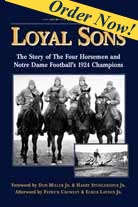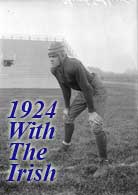It Was An Action-Packed
Election Week in Wisconsin: Fighting Bob, Sousa, Horsemen
It was a wild political season leading up to a Nov. 4 Election Day. And nowhere was the hum of events greater than in Madison, Wis.
In the space of one week, Madison welcomed home a political “favorite son,” played host to a musical giant, and witnessed what became an iconic sports team in American history.
The year was 1924, and a three-way race for president was raging across the U.S. Incumbent Republican Calvin Coolidge faced challenges from both West Virginia congressman John Davis, a compromise Democratic candidate, and Wisconsin Sen. Robert "Fighting Bob" LaFollette, carrying the banner of the upstart Progressive Party.
On Sunday, November 2, LaFollette concluded his quixotic run for the presidency and was greeted by a hearty reception of thousands of townspeople who met his train when it reached Madison. LaFollette retreated to his Maple Bluff home to await election results.
Two days later, on Nov. 4, he carried his home state and garnered 17 per cent of the popular vote, but he and Davis finished well behind Coolidge.
And two days after that, on Thursday November 6, the most famous musician of the time came to Madison. John Philip Sousa and his Orchestra brought down the house in a raucous concert at the Parkway Theatre. Local residents knew they were seeing and hearing something special.
“Seventy years old was Sousa Thursday, yet his band of skilled musicians played with as much colorful fire and vigor as if they were led by the young commander of 40 years ago,” read one review of the concert. The evening concluded with a rousing rendition of “On, Wisconsin” which shook the rafters and left the audience in a frenzy.
“Let’s hire him to stay over Saturday and play just once before the game starts,” a newspaper scribe enthused.
The Badgers of Coach Jack Ryan, it was implied, would need all the enthusiasm the city could muster, considering the opponent coming to Madison.
Over the previous three weeks, the Fighting Irish of Notre Dame had taken the nation by storm by traveling back-to-back weekends out East and defeating stalwarts Army and Princeton, then trouncing Southern power Georgia Tech, 34-3.
Along the way, the Irish backfield had been dubbed “the Four Horsemen” by New York’s leading sports writer, Grantland Rice. As each victory was recorded, the fame of Coach Knute Rockne’s “wonder team” spread across the land. Fans from across the Midwest streamed into Madison to get a glimpse of the famous eleven in Saturday’s encounter at Camp Randall Stadium. Hundreds of Notre Dame students also made the train trip, as the game was the designated “student road trip” for the 1924 season.
Among the ‘Horsemen’ was one of the most exhilarating backs in college football, Green Bay native “Sleepy Jim” Crowley. He had been coached at Green Bay’s East High School by Earl “Curly” Lambeau, who himself had played some football under Rockne at Notre Dame before returning home to found a gridiron enterprise that became known as the Green Bay Packers.
Wisconsin had entered the 1924 season with a number of talented returnees and excellent prospects for success. But an avalanche of difficult circumstances left the Badgers reeling entering the game.
Injuries to key players, including tackle Austin Straubel, a teammate of Crowley’s in Green Bay and later a famous figure in aviation, depleted the line. Sudden ineligibilities further thinned the ranks. And on October 23, a horrific tragedy rocked the squad – senior backup quarterback Herbert Opitz was electrocuted in an accident during an engineering class lab.
Before a packed Camp Randall crowd of 28,425, the Badgers held the powerful Irish to a 3-3 first-quarter tie before Rockne’s troops opened up a 17-3 halftime lead, with Crowley scoring on a touchdown reception from Harry Stuhldreher, who would later spend a good portion of his career as Wisconsin’s coach and athletic director.
In the second half, Crowley’s second touchdown put the Irish ahead 31-3 and sent the subs into the game. Ward “Doc” Connell from Beloit had a number of good gains for ND, and Appleton’s Jack Roach concluded the scoring in a 38-3 Notre Dame victory.
The Madison community appreciated the once-in-a-lifetime opportunity to see such a finely honed football machine. That evening, they jammed the Loraine Hotel ballroom for a Knights of Columbus banquet honoring Rockne and his team. Tributes came from local athletic and political dignitaries.
Notre Dame went on to defeat Nebraska, Northwestern and Carnegie Tech to finished the regular season 9-0, before defeating Coach Pop Warner’s Stanford team, led by Superior, Wis., star Ernie Nevers, 27-10, in the 1925 Tournament of Roses game in Pasadena, Calif.
The Irish thus became the first football team to play in New York City, Chicago and southern California in the same season. Six of its 11 regulars were elected to the College Football Hall of Fame. The school was awarded its first of 11 consensus national championships.






